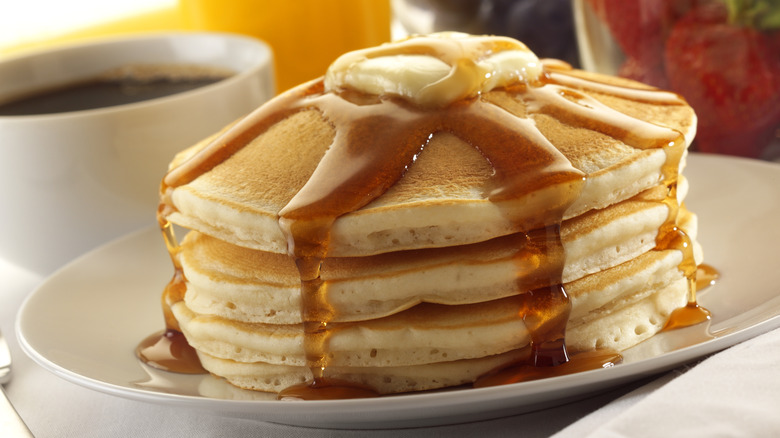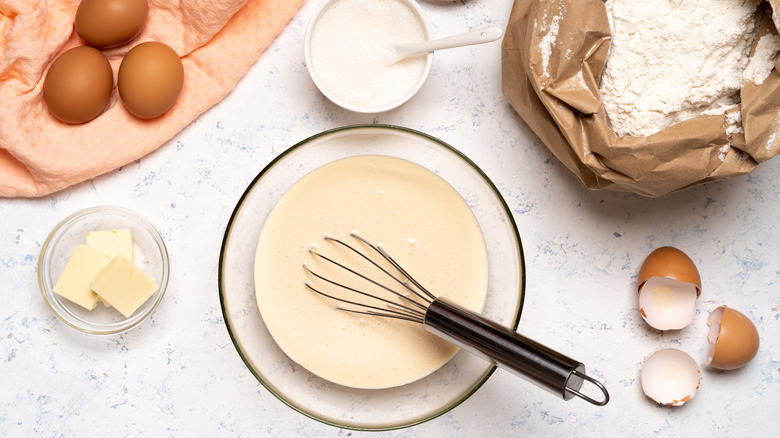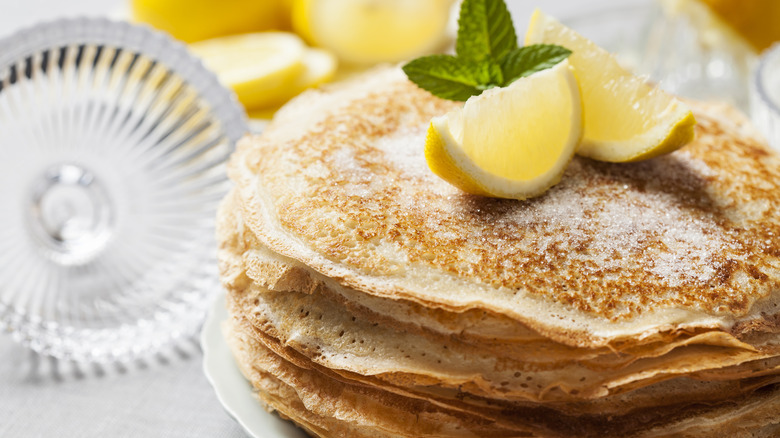Eating Pancakes On Mardi Gras Is A Centuries-Old Tradition
While the historical and culinary celebration commonly known as Mardi Gras in America capitalizes on spicy New Orleans' cuisine like gumbo, jambalaya, and red beans and rice, the holiday also tightly embraces its sweeter side. In fact, Mardi Gras got its start surrounded by the combination of sugar, flour, and dairy products.
That's right, it's not all about colorful beads and extravagant costumes. In fact, throughout its rich history of parades and religious connections, Mardi Gras has represented an all-out party for all the senses, not excluding the sweet tooth. For example, the most iconic, and colorful, expression of this confectionery exploration is the ubiquitous King Cake, found at every home and office Mardi Gras celebration. Possibly a lesser-known fact is that making and eating pancakes as part of the Mardi Gras festival has an equally long history as King Cake, and we have the English to thank for that.
How pancakes became part of Mardi Gras
Let's start with a brief history lesson. Mardi Gras dates back to the days of the Roman Empire's celebration of spring and fertility. As Christianity was introduced across Europe, this ritual became associated with Lent, the 40-day observance of fasting and prayer leading up to Easter. The idea of making a personal sacrifice for Lent led to the avoidance of meat and dairy products.
In a final splurge before committing to the restrictions imposed by Lent, households across the continent rushed to use up their remaining eggs, milk, and butter on the night before Ash Wednesday — the first day of Lent. Hence, the tradition of whipping up a batch of pancakes was born. Although that's where the tradition got its start, eating pancakes wasn't directly connected to Mardi Gras until the French — also seeking to use up those same deliciously fatty ingredients — started making waffles, crepes, and the aforementioned King Cake. And so it goes, the French named this occasion Mardi Gras, which translates to Fat Tuesday. On the other hand, the English named it Pancake Day, which they still celebrate today.
A celebration by many names
These early traditions vary regionally while honoring the basic idea that Fat Tuesday, or Pancake Day, lands the day before Ash Wednesday, which is 40 days before Easter. Over time, the lines have blurred between Fat Tuesday and the weeks-long celebration known as Mardi Gras that starts with Twelfth Night on January 6th, and ends on Fat Tuesday.
In England, the traditional feasting event known elsewhere as Fat Tuesday is also called Shrove Tuesday — and Pancake Day — but it's about more than simply eating pancakes. In fact, it celebrates the mere existence of pancakes with the Olney pancake race, a competition where housewives raced down the road, adorned with aprons, and flipped pancakes in skillets as they ran. While the association between pancakes and Mardi Gras is less defined in the U.S. than in the U.K., Ireland, Australia, and Canada, we say any day is a good day to eat pancakes.


